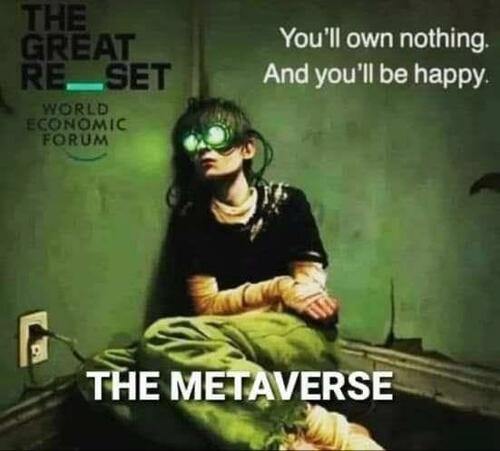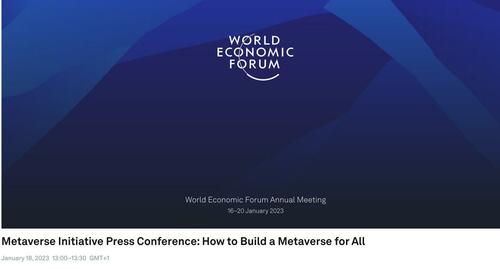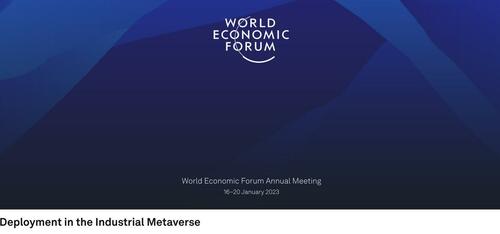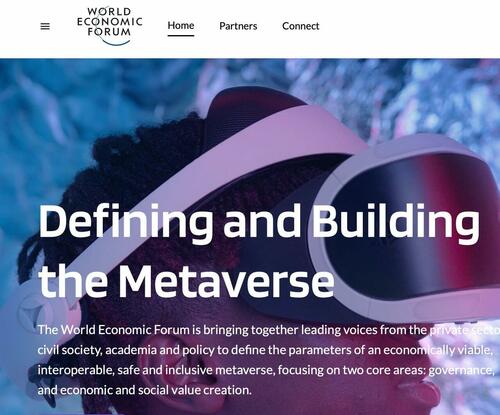
Authored by Jordan Schachtel via The Dossier,
During its 2023 Davos conference, the World Economic Forum will host a press conference on its “Building The Metaverse Initiative,” and release key “studies” and details about its efforts to further facilitate what appears to amount to a global surveillance network, according to documents reviewed by The Dossier.
The Metaverse, a buzzworthy bumper sticker slogan that refers to a whole host of ideas in the technology space, has potential current and future applications both for private and governmental entities. It will be featured as one of the core staples of the 2023 Davos conference.
What is the Metaverse, exactly?
The term Metaverse was invented by author Neal Stephenson in his 1992 sci-fi novel Snow Crash, in which citizens used digital avatars as a means to escape their dystopian reality.
Today it can be defined as “a vision of what many in the computer industry believe is the next iteration of the internet: a single, shared, immersive, persistent, 3D virtual space where humans experience life in ways they could not in the physical world.” Before its expanded definition, the Metaverse encompassed a technologically advancing virtual and augmented reality space.
To entrepreneurs and technology companies, this computer world can serve as a potential revenue and data harvesting stream. For the committed forces of technocratic tyranny, the Metaverse can act as a global surveillance network that can keep tabs on anyone with an internet connection. A Metaverse-adopting society can make it much easier for ruling governments to track the movement, behaviors, and activities of its citizens.
For the World Economic Forum, the narrative and ideas shop of the ruling class, the latter applications are more aligned with their feudalistic ambitions.
The WEF is the chief coalition builder for what amounts to the modern depopulation movement. Over the years, they've partnered with Big Tech, central bankers, governmental, and international organizations to facilitate their feudalistic vision for the future, which involves deliberately rolling back human progress, innovation, and flourishing, under the guise of saving the planet from a “climate emergency.” While various WEF “partners” have different motives for joining the ruling class alliance, they all have an incentive to cater to the WEF’s most prized climate hoax narratives.
The WEF Metaverse press conference event description reads:
“This press conference will announce the first, and long-awaited, outputs of the Defining and Building the Metaverse Initiative: highly anticipated briefing papers on Interoperability in the Metaverse from the governance track of the project, and Demystifying the Consumer Metaverse from the value creation track. These two briefing papers, the first in each workstream’s series, will serve as the foremost publications involving this amount of research, this number of stakeholders from diverse industries (120+ partners are involved in this initiative), into these topics.”
The WEF will also host an event at Davos 2023 titled “Deployment In The Industrial Metaverse.” Panelists will discuss how “the next era of the internet is fast approaching in the form of the metaverse, an immersive, interoperable and synchronous digital world.”
“In the industrial metaverse, unique opportunities will arise from the convergence of artificial intelligence, digital twins, data and robotic technologies,” the readout continues.
The Dossier reviewed a list of the listed partners to the World Economic Forum’s Metaverse Initiative. They include corporate actors like Meta (formerly known as Facebook), Microsoft, Walmart, and Sony. Notably, the list includes major financial services and banking enterprises, such as Mastercard, Deutsche Bank, J.P. Morgan, and Lloyds.
Things really take a dark turn when moving down to the state and global governance partners to the WEF’s Metaverse Initiative. These partners include Interpol, the United Nations counter terrorism office, the U.S. NIH’s National Human Genome Research Institute, and several additional countries’ information and communication ministries.
The WEF looks to the Chinese Communist Party as the model nation for proper governance. The CCP’s nationwide surveillance regime, through its “Great Firewall” and other components, could very well become the standard for Metaverse governance.
Earlier this month, the WEF published an article titled, “why we need to regulate digital identity in the Metaverse,” revealing that Davos indeed sought a heavy-handed top-down approach akin to the CCP’s measures.
JUST IN - Klaus Schwab's WEF: "The internet will eventually evolve into the metaverse, which will come to represent the next major computing platform."
— H.K. Belvedere Ω (@HKBelvedere) October 30, 2021
These people are so far removed from reality it’s scary.
In May, WEF founder Klaus Schwab addressed his organization’s Metaverse work. Schwab reveals a lot about his intentions in his framing of the term, stating:
“The metaverse will influence the way, people, governments, companies and society at large think, work, interact and communicate for the purpose of collectively addressing issues on the global agenda.”
Authored by Jordan Schachtel via The Dossier,
During its 2023 Davos conference, the World Economic Forum will host a press conference on its “Building The Metaverse Initiative,” and release key “studies” and details about its efforts to further facilitate what appears to amount to a global surveillance network, according to documents reviewed by The Dossier.
The Metaverse, a buzzworthy bumper sticker slogan that refers to a whole host of ideas in the technology space, has potential current and future applications both for private and governmental entities. It will be featured as one of the core staples of the 2023 Davos conference.
What is the Metaverse, exactly?
The term Metaverse was invented by author Neal Stephenson in his 1992 sci-fi novel Snow Crash, in which citizens used digital avatars as a means to escape their dystopian reality.
Today it can be defined as “a vision of what many in the computer industry believe is the next iteration of the internet: a single, shared, immersive, persistent, 3D virtual space where humans experience life in ways they could not in the physical world.” Before its expanded definition, the Metaverse encompassed a technologically advancing virtual and augmented reality space.
To entrepreneurs and technology companies, this computer world can serve as a potential revenue and data harvesting stream. For the committed forces of technocratic tyranny, the Metaverse can act as a global surveillance network that can keep tabs on anyone with an internet connection. A Metaverse-adopting society can make it much easier for ruling governments to track the movement, behaviors, and activities of its citizens.
For the World Economic Forum, the narrative and ideas shop of the ruling class, the latter applications are more aligned with their feudalistic ambitions.
The WEF is the chief coalition builder for what amounts to the modern depopulation movement. Over the years, they’ve partnered with Big Tech, central bankers, governmental, and international organizations to facilitate their feudalistic vision for the future, which involves deliberately rolling back human progress, innovation, and flourishing, under the guise of saving the planet from a “climate emergency.” While various WEF “partners” have different motives for joining the ruling class alliance, they all have an incentive to cater to the WEF’s most prized climate hoax narratives.
The WEF Metaverse press conference event description reads:
“This press conference will announce the first, and long-awaited, outputs of the Defining and Building the Metaverse Initiative: highly anticipated briefing papers on Interoperability in the Metaverse from the governance track of the project, and Demystifying the Consumer Metaverse from the value creation track. These two briefing papers, the first in each workstream’s series, will serve as the foremost publications involving this amount of research, this number of stakeholders from diverse industries (120+ partners are involved in this initiative), into these topics.”
The WEF will also host an event at Davos 2023 titled “Deployment In The Industrial Metaverse.” Panelists will discuss how “the next era of the internet is fast approaching in the form of the metaverse, an immersive, interoperable and synchronous digital world.”
“In the industrial metaverse, unique opportunities will arise from the convergence of artificial intelligence, digital twins, data and robotic technologies,” the readout continues.
The Dossier reviewed a list of the listed partners to the World Economic Forum’s Metaverse Initiative. They include corporate actors like Meta (formerly known as Facebook), Microsoft, Walmart, and Sony. Notably, the list includes major financial services and banking enterprises, such as Mastercard, Deutsche Bank, J.P. Morgan, and Lloyds.
Things really take a dark turn when moving down to the state and global governance partners to the WEF’s Metaverse Initiative. These partners include Interpol, the United Nations counter terrorism office, the U.S. NIH’s National Human Genome Research Institute, and several additional countries’ information and communication ministries.
The WEF looks to the Chinese Communist Party as the model nation for proper governance. The CCP’s nationwide surveillance regime, through its “Great Firewall” and other components, could very well become the standard for Metaverse governance.
Earlier this month, the WEF published an article titled, “why we need to regulate digital identity in the Metaverse,” revealing that Davos indeed sought a heavy-handed top-down approach akin to the CCP’s measures.
JUST IN – Klaus Schwab’s WEF: “The internet will eventually evolve into the metaverse, which will come to represent the next major computing platform.”
These people are so far removed from reality it’s scary.
— H.K. Belvedere Ω (@HKBelvedere) October 30, 2021
In May, WEF founder Klaus Schwab addressed his organization’s Metaverse work. Schwab reveals a lot about his intentions in his framing of the term, stating:
“The metaverse will influence the way, people, governments, companies and society at large think, work, interact and communicate for the purpose of collectively addressing issues on the global agenda.”
Loading…










